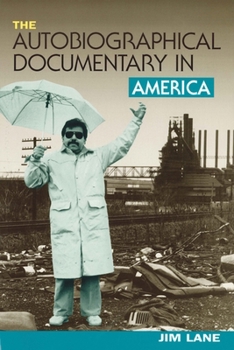The Autobiographical Documentary in America
(Part of the Wisconsin Studies in Autobiography Series)
Select Format
Select Condition 
Book Overview
This is a provocative look at writing by and about people with illness or disability in particular HIV/AIDS, breast cancer, deafness, and paralysis who challenge the stigmas attached to their conditions by telling their lives in their own ways and on their own terms. Discussing memoirs, diaries, collaborative narratives, photo documentaries, essays, and other forms of life writing, G. Thomas Couser shows that these books are not primarily records of medical conditions; they are a means for individuals to recover their bodies (or those of loved ones) from marginalization and impersonal medical discourse.
Responding to the recent growth of illness and disability narratives in the United States such works as Juliet Wittman s Breast Cancer Journal, John Hockenberry s Moving Violations, Paul Monette s Borrowed Time: An AIDS Memoir, and Lou Ann Walker s A Loss for Words: The Story of Deafness in a Family Couser addresses questions of both poetics and politics. He examines why and under what circumstances individuals choose to write about illness or disability; what role plot plays in such narratives; how and whether closure is achieved; who assumes the prerogative of narration; which conditions are most often represented; and which literary conventions lend themselves to representing particular conditions. By tracing the development of new subgenres of personal narrative in our time, this book explores how explicit consideration of illness and disability has enriched the repertoire of life writing. In addition, Couser s discussion of medical discourse joins the current debate about whether the biomedical model is entirely conducive to humane care for ill and disabled people.
With its sympathetic critique of the testimony of those most affected by these conditions, Recovering Bodies contributes to an understanding of the relations among bodily dysfunction, cultural conventions, and identity in contemporary America."
Responding to the recent growth of illness and disability narratives in the United States such works as Juliet Wittman s Breast Cancer Journal, John Hockenberry s Moving Violations, Paul Monette s Borrowed Time: An AIDS Memoir, and Lou Ann Walker s A Loss for Words: The Story of Deafness in a Family Couser addresses questions of both poetics and politics. He examines why and under what circumstances individuals choose to write about illness or disability; what role plot plays in such narratives; how and whether closure is achieved; who assumes the prerogative of narration; which conditions are most often represented; and which literary conventions lend themselves to representing particular conditions. By tracing the development of new subgenres of personal narrative in our time, this book explores how explicit consideration of illness and disability has enriched the repertoire of life writing. In addition, Couser s discussion of medical discourse joins the current debate about whether the biomedical model is entirely conducive to humane care for ill and disabled people.
With its sympathetic critique of the testimony of those most affected by these conditions, Recovering Bodies contributes to an understanding of the relations among bodily dysfunction, cultural conventions, and identity in contemporary America."
Format:Paperback
Language:English
ISBN:0299176541
ISBN13:9780299176549
Release Date:April 2002
Publisher:University of Wisconsin Press
Length:264 Pages
Weight:0.95 lbs.
Dimensions:0.6" x 6.2" x 9.0"
Customer Reviews
1 rating
Great Intro to a fascinating area of personal filmmaking
Published by Thriftbooks.com User , 22 years ago
I read a lot of film books and, for me, the best ones accomplish one of two things: they either introduce me to films or genres that I know little about, or they give me new insight into films and genres that I love. Jim Lane's book manages to do both in a straight-forward, intelligent, but easily accessible style that accomodates both serious film scholars and the cocktail party film buff (like me). I knew next to nothing about the autobiographical documentary (and frankly, had little interest in exploring it) but I was drawn to the book because of my appreciation for "David Holzman's Diary". Of course, I read that section first, and enjoyed it so much that I found myself turning to the beginning of the book and reading about films that I had never seen. I ended up tracking down all the films central to the book, viewing them, and then returning to the chapters in the book to compare the authors views with my own. What better compliment to pay a film book than to say it inspired me to go out and see more films.






